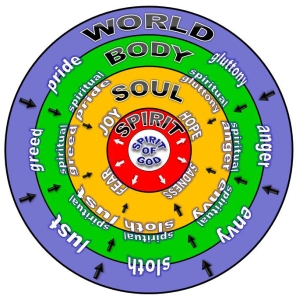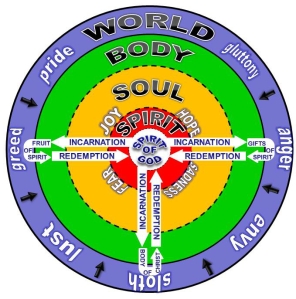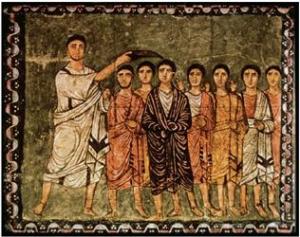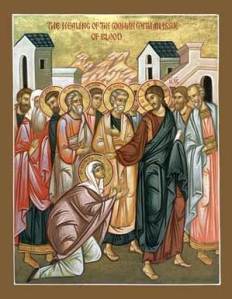 I’ve been reading one of my favorite Christian thinkers, Evelyn Underhill. You can go to Amazon and download a ton of her books for .99 or free. They are public domain. She lived from 1875-1941 and was a great philosophical, theological, and mystical thinker for the Christian faith. The Anglican and Episcopal church celebrate her veneration on June 15th. So she’s legit. But I warn you in advance, you may want to start with her retreat material instead of her straight up theology material. It’s thick.
I’ve been reading one of my favorite Christian thinkers, Evelyn Underhill. You can go to Amazon and download a ton of her books for .99 or free. They are public domain. She lived from 1875-1941 and was a great philosophical, theological, and mystical thinker for the Christian faith. The Anglican and Episcopal church celebrate her veneration on June 15th. So she’s legit. But I warn you in advance, you may want to start with her retreat material instead of her straight up theology material. It’s thick.
As I was reading her work on the fruit of the Spirit, she said something that got my gears rolling. She said, “I do not think that St. Paul arranged his list of the fruits of the Spirit in a casual order. They represent a progressive series from one point and that one point is Love, the living eternal seed from which all grow.” (Fruits of the Spirit page 14)
I have always thought of the list as a list of casual order, but I have been wrong, for Paul was too smart and intentional to write with such inattention. Paul has a specific task to take on in writing to the Galatian churches. He is approaching the issue of moralism and legalism within the church and how to correct it.
Moralism and Legalism is an attempt to earn the favor of God through good and correct behavior. We all fall into this trap, the trouble is when you start to lead others there and preach it as gospel, which Paul says that let that person be accursed, so look out fundies, don’t read Galatians because Paul is after you. The problem with moralism is that it is an aversion to the Gospel of grace and faith. It is easy to tell when someone takes a diversion from the Gospel into utter paganism, but it is harder to tell when someone has diverted from the Gospel through their own goodness.
Our problem is that we see the kind of life that the Bible is asking of us, and we compare this to our own life, and we see two options: 1. Give up 2. Fake it. Many Christians, as I have in my past, have taken option number two. I mean, who doesn’t want to measure up?! So here we are with a bare tree of faith with no moral fruit hanging on it, so we dress it up like a Christmas tree with ornamental morals precariously hung from our timid branches, and when someone bumps us or irritates us, our ornamental morals fall off and shatter on the ground. Then we take a double dose of guilt and shame and double our efforts to keep those ornaments hung.
There is a problem with ornamental morals. They are fake and contain no life within them to multiply themselves. They only are for the glory and use of the ornamented. This is why self-control comes last on the fruits list. We want to start with self-control, but there is a process that we have to walk in order to see self-control take place, eight other fruits precede it, and lead to it. This is the third way that Paul describes in Galatians, but it is a longer path that requires much patience. It is not giving up or faking it.
Our faith life is like a la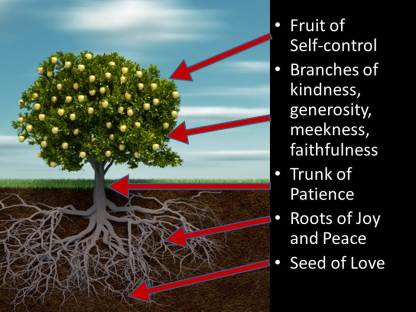 rge tree that starts from a seed, a seed of God’s love planted in our life, His full blown, all out, recklessly extravagant love. This love meets us in every place of our brokenness and loves us still, even though we are so broken. As we learn the depth of our brokenness and belovedness, we cultivate this seed of love, and eventually roots start to plant. These roots are the grounding of the plant and hold it firm: Joy and Peace.
rge tree that starts from a seed, a seed of God’s love planted in our life, His full blown, all out, recklessly extravagant love. This love meets us in every place of our brokenness and loves us still, even though we are so broken. As we learn the depth of our brokenness and belovedness, we cultivate this seed of love, and eventually roots start to plant. These roots are the grounding of the plant and hold it firm: Joy and Peace.
Joy and Peace are refined through trial and storm and a stalk of patience emerges from the soil. Patience, we learn is refined and expanded love that has been tested. This stalk becomes firm and tough, able to withstand the winds of the storms of life. Eventually branches start to reach out to the world, branches of kindness, goodness, faithfulness, and meekness. These characteristics are how we reach the world.
On these branches are fruits of self-control, which is far more than the willpower to not sin, but it is the ability to control one’s self and operate in the manner in which God would have us to operate in order to bring his will to fruition in certain circumstances. Instead of an opportunity to sin, we have a transformed opportunity to do good and bring about God’s will.
And of course hidden within our self-control are seeds of God’s love that can be planted within the world to see more lives touched by God’s life.

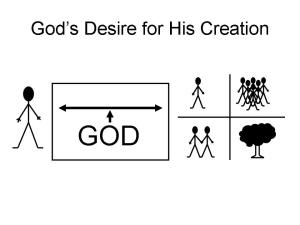
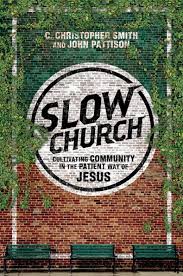
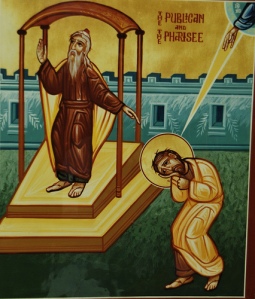


 ssed a certain profound interior peace…” The church fathers and mothers would call this interior peace with God “union.” It seems, then, uncommon for one to find a Christian, even a “Christian leader” with an interior peace about them. Yet this is the goal of the very Gospel we preach: to unite us to God. I developed two illustrations of the human trichotomy of body, soul, and spirit during a meditative study on St. John of the Cross’ writings. One illustrates John’s concept of Union with God, or in our case, Shalom: a human fully alive and living as God intended. The other illustrates John’s concept of a soul not in union with God, out of sync with itself. It is a picture of the journey I have been on as a leader and pastor, and a picture of my goal in this life.
ssed a certain profound interior peace…” The church fathers and mothers would call this interior peace with God “union.” It seems, then, uncommon for one to find a Christian, even a “Christian leader” with an interior peace about them. Yet this is the goal of the very Gospel we preach: to unite us to God. I developed two illustrations of the human trichotomy of body, soul, and spirit during a meditative study on St. John of the Cross’ writings. One illustrates John’s concept of Union with God, or in our case, Shalom: a human fully alive and living as God intended. The other illustrates John’s concept of a soul not in union with God, out of sync with itself. It is a picture of the journey I have been on as a leader and pastor, and a picture of my goal in this life.